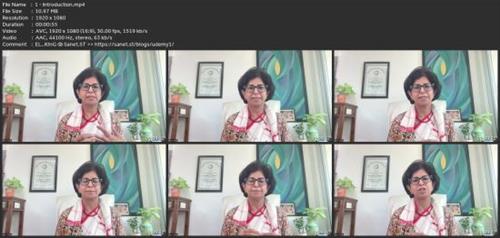- Thread Starter
- #1
Navigating Eeg: A Complete Journey From Basics To Reporting

From Brainwaves to Reports EEG Basics, Brainwave Types and Clinical Interpretation for Accurate Diagnosis and Reporting
What you'll learn
Understand the Fundamentals: Gain a thorough understanding of the basics of EEG, including its uses and applications in neurological assessments.
Perform Accurate EEG Procedures: Learn the step-by-step protocols for performing EEGs, ensuring proper setup and data collection.
Interpret EEG Results: Develop the skills to analyze and interpret different types of EEG patterns for various neurological conditions.
Create Comprehensive Reports: Learn to compile accurate and detailed EEG reports that aid in clinical decision-making and patient care.
Requirements
No Prior EEG Experience Needed: This course is suitable for both beginners and professionals with no prior EEG knowledge. Basic Medical Understanding: A foundational knowledge of human anatomy or neurology is helpful but not mandatory. Computer Literacy: Learners should have basic computer skills to navigate the course materials and use EEG software, if applicable. Language Proficiency: A good understanding of English (or the course language) is required to follow the lessons effectively. Access to Equipment (Optional): While not mandatory, having access to EEG equipment will allow for hands-on practice and deeper learning.
Description
This comprehensive EEG course is designed to guide learners through the fundamental principles and advanced applications of Electroencephalography (EEG). EEG is a non-invasive technique used to record brainwave activity, crucial for diagnosing neurological conditions such as epilepsy, sleep disorders, and brain injuries, and even monitoring brain health during surgeries or after trauma. The course begins with a solid introduction to EEG, covering the science behind brainwave detection and the importance of different brainwave patterns.Students will gain in-depth knowledge of EEG protocols, equipment setup, troubleshooting, and safe handling procedures. The course also covers clinical applications, including how EEG is used to monitor neurological health and assist in the diagnosis of various disorders. Through hands-on demonstrations and lectures, learners will explore how to perform, interpret, and report EEG findings accurately.By the end of the course, students will be equipped with the skills to confidently conduct EEG tests, understand brainwave patterns, troubleshoot technical issues, and provide accurate reports that support clinical decision-making. This course is ideal for healthcare professionals, technicians, and students in neurology, sleep medicine, or allied health fields who want to enhance their knowledge, improve practical skills, and excel in EEG technology, diagnostics, patient care, and medical research practices.
Overview
Section 1: Introduction
Lecture 1 Introduction
Lecture 2 Introduction about EEG
Lecture 3 When to get an EEG
Lecture 4 Room Preparation and How to handle Patient
Lecture 5 Interpretation of EEG
Lecture 6 Artefacts
Lecture 7 Reporting of EEG
Curious Beginners, Healthcare Professionals, Medical Students & Trainees, Technicians, Researchers & Academics: Individuals in neuroscience and related research fields who want to deepen their understanding of EEG protocols, procedures, and analysis for research purposes.

Say "Thank You"
rapidgator.net:
nitroflare.com:
ddownload.com:

Published 11/2024
MP4 | Video: h264, 1920x1080 | Audio: AAC, 44.1 KHz
Language: English | Size: 549.07 MB | Duration: 0h 55m
MP4 | Video: h264, 1920x1080 | Audio: AAC, 44.1 KHz
Language: English | Size: 549.07 MB | Duration: 0h 55m
From Brainwaves to Reports EEG Basics, Brainwave Types and Clinical Interpretation for Accurate Diagnosis and Reporting
What you'll learn
Understand the Fundamentals: Gain a thorough understanding of the basics of EEG, including its uses and applications in neurological assessments.
Perform Accurate EEG Procedures: Learn the step-by-step protocols for performing EEGs, ensuring proper setup and data collection.
Interpret EEG Results: Develop the skills to analyze and interpret different types of EEG patterns for various neurological conditions.
Create Comprehensive Reports: Learn to compile accurate and detailed EEG reports that aid in clinical decision-making and patient care.
Requirements
No Prior EEG Experience Needed: This course is suitable for both beginners and professionals with no prior EEG knowledge. Basic Medical Understanding: A foundational knowledge of human anatomy or neurology is helpful but not mandatory. Computer Literacy: Learners should have basic computer skills to navigate the course materials and use EEG software, if applicable. Language Proficiency: A good understanding of English (or the course language) is required to follow the lessons effectively. Access to Equipment (Optional): While not mandatory, having access to EEG equipment will allow for hands-on practice and deeper learning.
Description
This comprehensive EEG course is designed to guide learners through the fundamental principles and advanced applications of Electroencephalography (EEG). EEG is a non-invasive technique used to record brainwave activity, crucial for diagnosing neurological conditions such as epilepsy, sleep disorders, and brain injuries, and even monitoring brain health during surgeries or after trauma. The course begins with a solid introduction to EEG, covering the science behind brainwave detection and the importance of different brainwave patterns.Students will gain in-depth knowledge of EEG protocols, equipment setup, troubleshooting, and safe handling procedures. The course also covers clinical applications, including how EEG is used to monitor neurological health and assist in the diagnosis of various disorders. Through hands-on demonstrations and lectures, learners will explore how to perform, interpret, and report EEG findings accurately.By the end of the course, students will be equipped with the skills to confidently conduct EEG tests, understand brainwave patterns, troubleshoot technical issues, and provide accurate reports that support clinical decision-making. This course is ideal for healthcare professionals, technicians, and students in neurology, sleep medicine, or allied health fields who want to enhance their knowledge, improve practical skills, and excel in EEG technology, diagnostics, patient care, and medical research practices.
Overview
Section 1: Introduction
Lecture 1 Introduction
Lecture 2 Introduction about EEG
Lecture 3 When to get an EEG
Lecture 4 Room Preparation and How to handle Patient
Lecture 5 Interpretation of EEG
Lecture 6 Artefacts
Lecture 7 Reporting of EEG
Curious Beginners, Healthcare Professionals, Medical Students & Trainees, Technicians, Researchers & Academics: Individuals in neuroscience and related research fields who want to deepen their understanding of EEG protocols, procedures, and analysis for research purposes.
Screenshots

Say "Thank You"
rapidgator.net:
You must reply in thread to view hidden text.
nitroflare.com:
You must reply in thread to view hidden text.
ddownload.com:
You must reply in thread to view hidden text.
